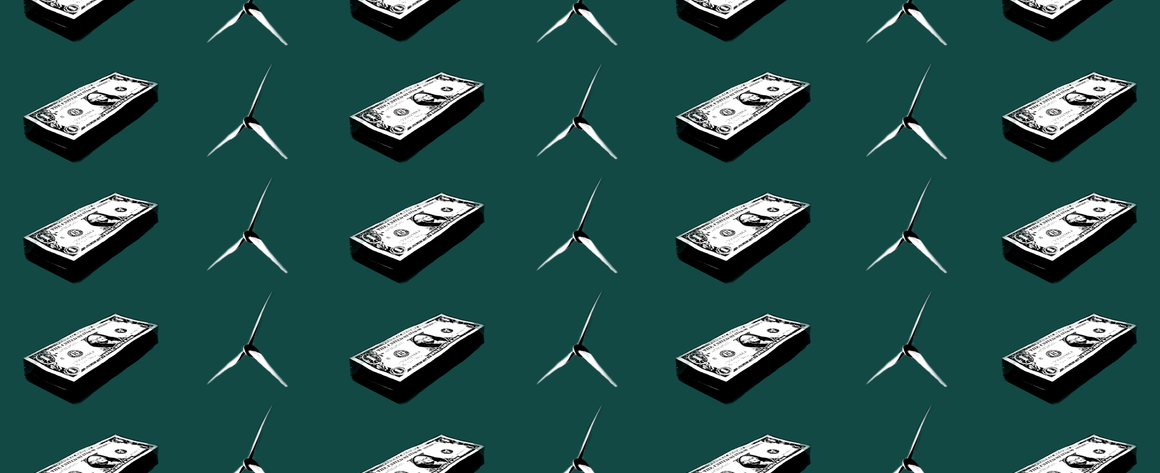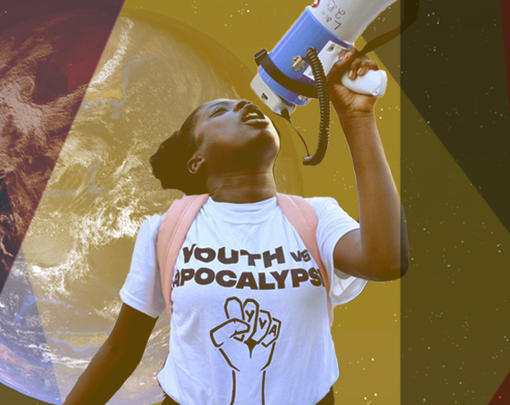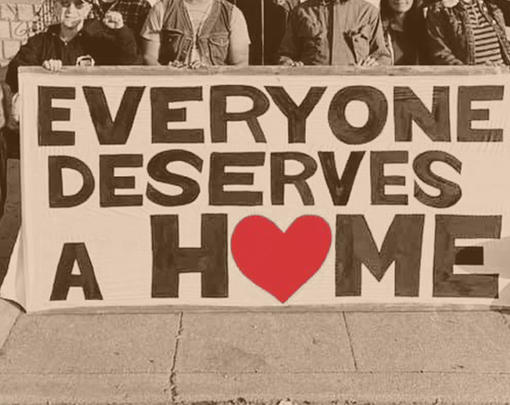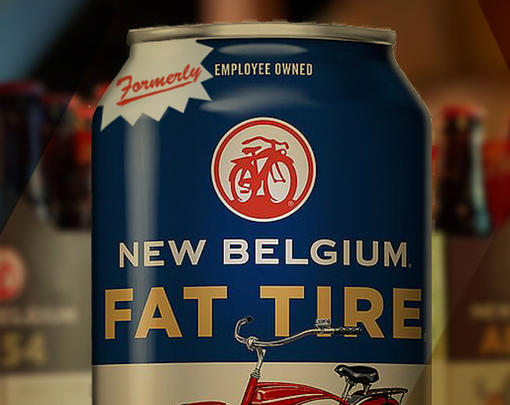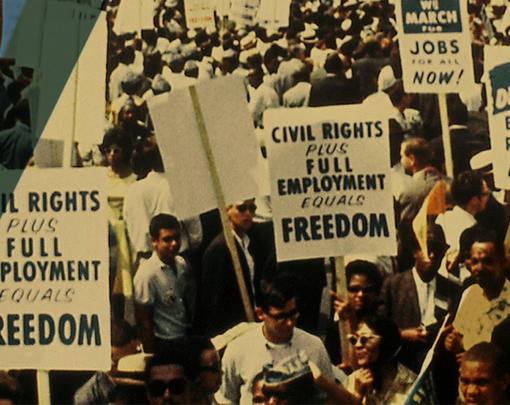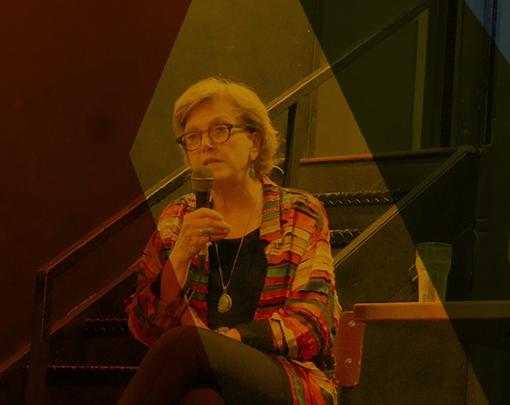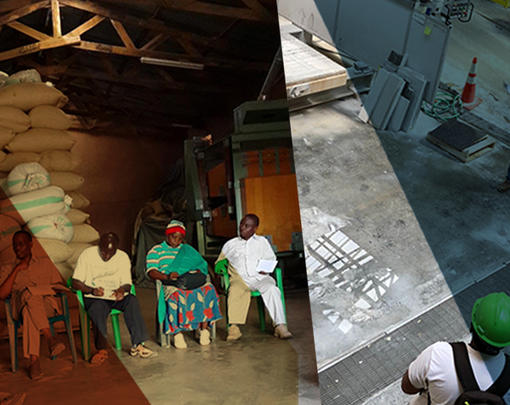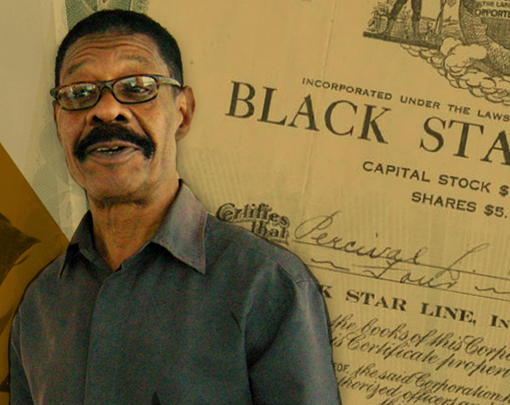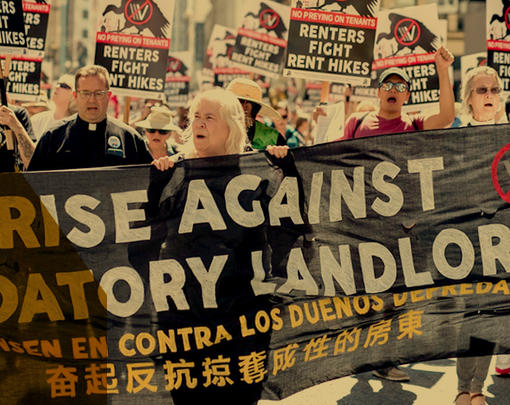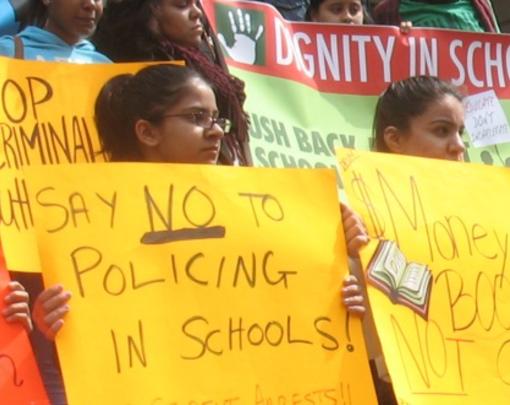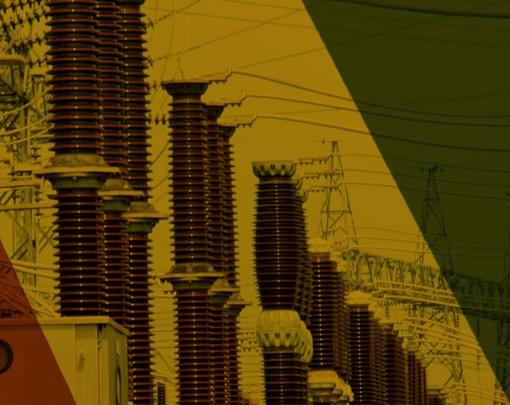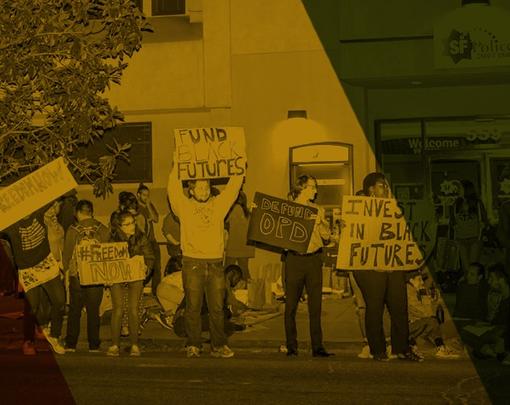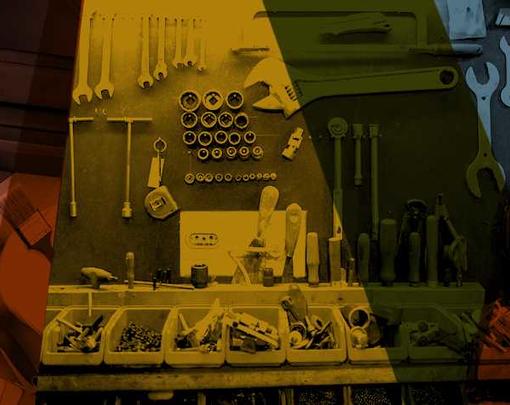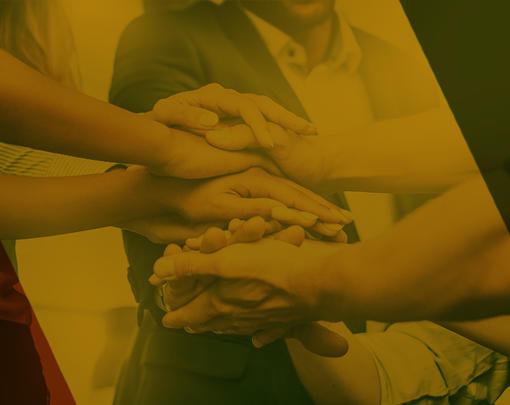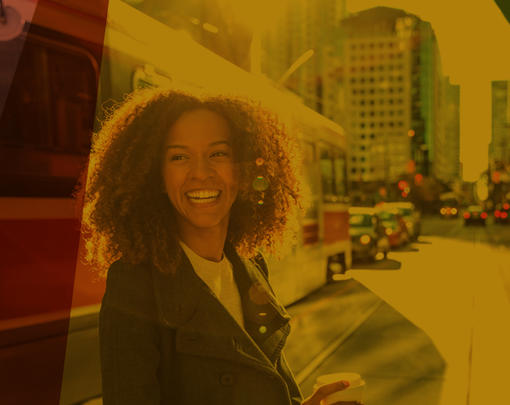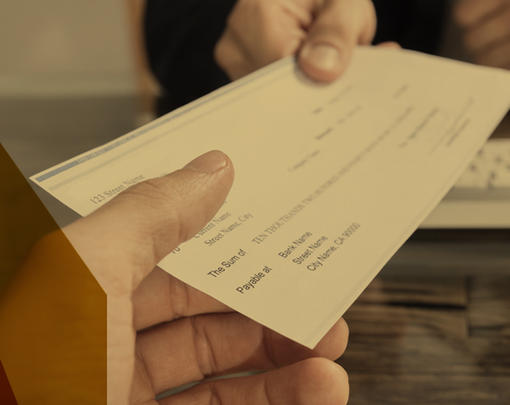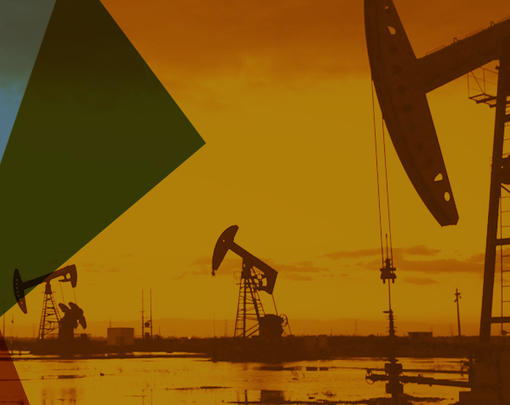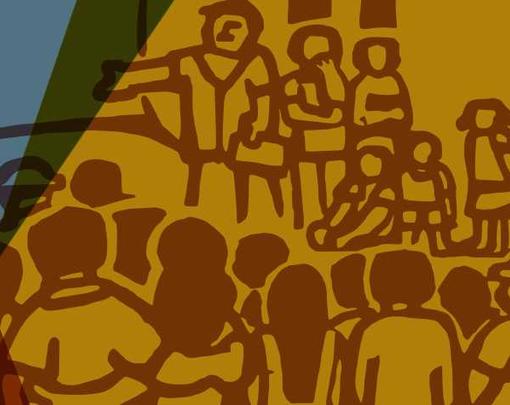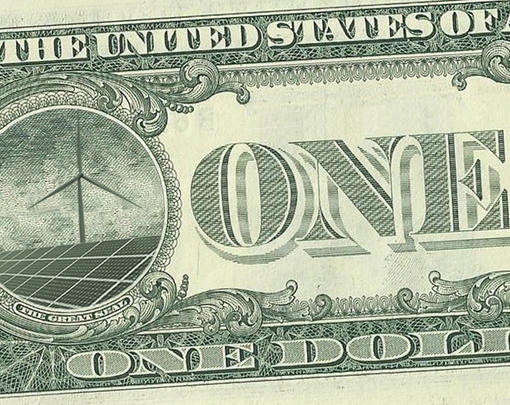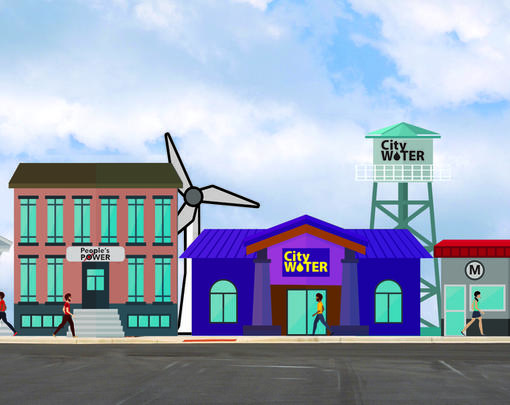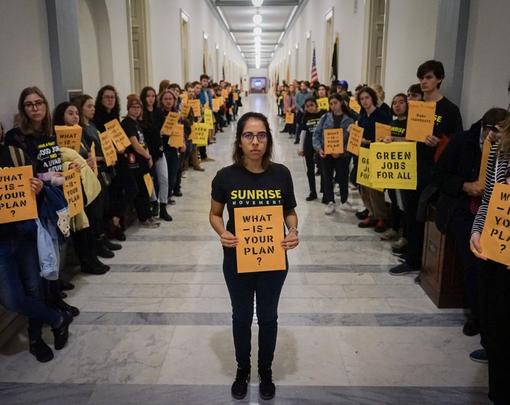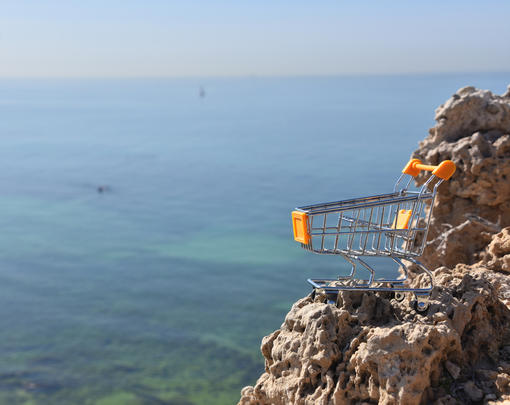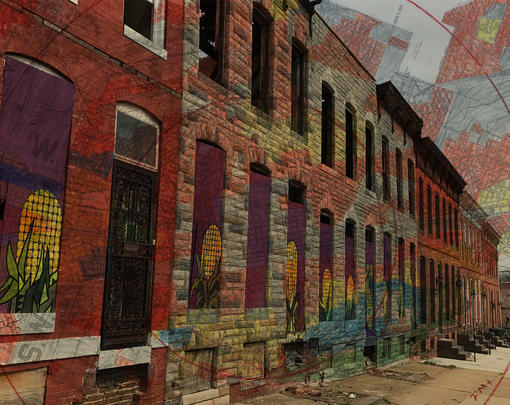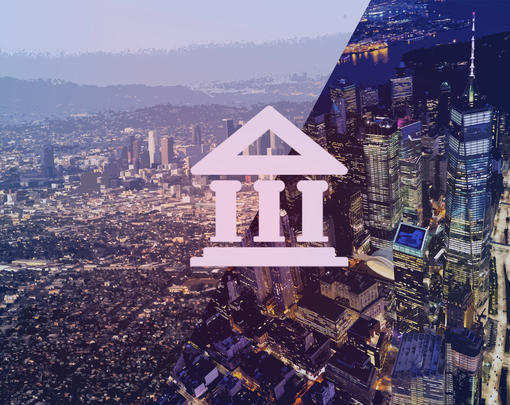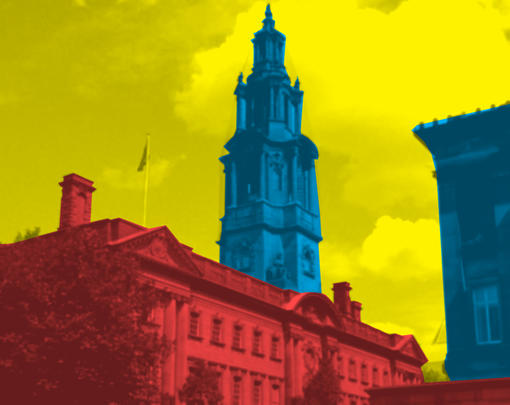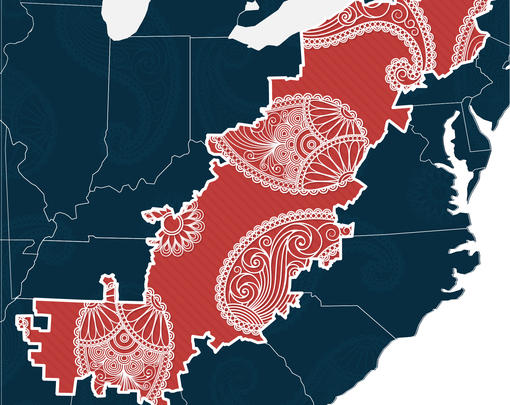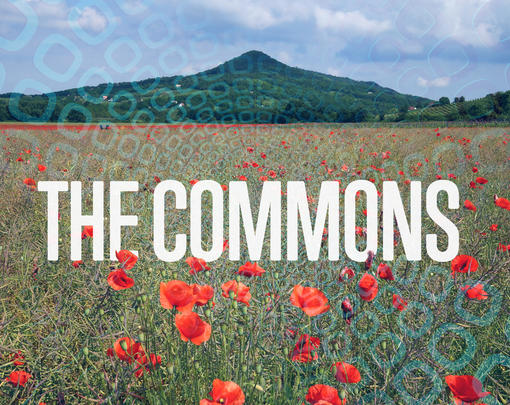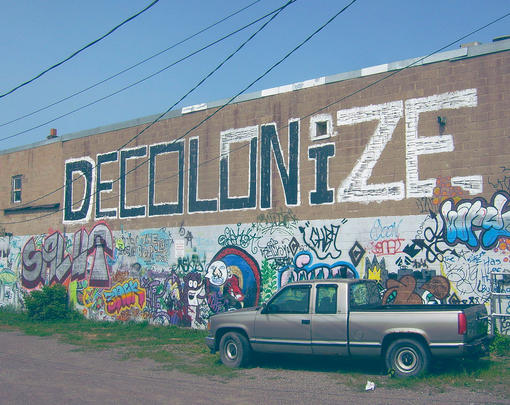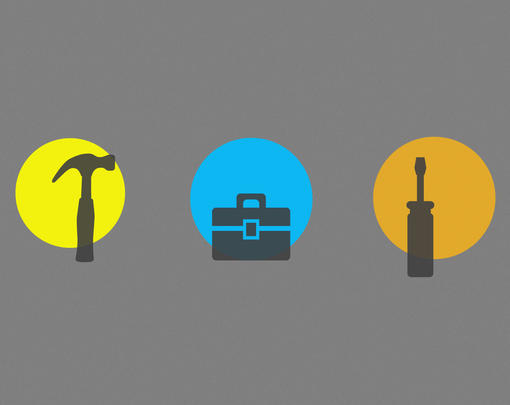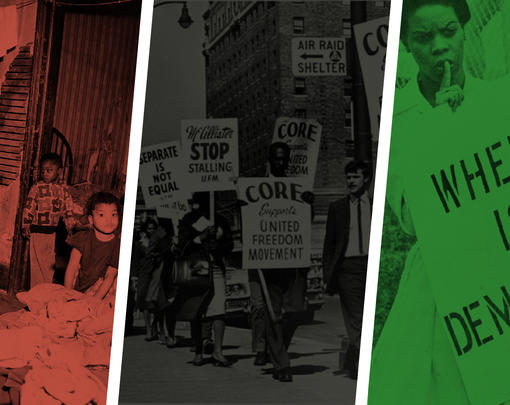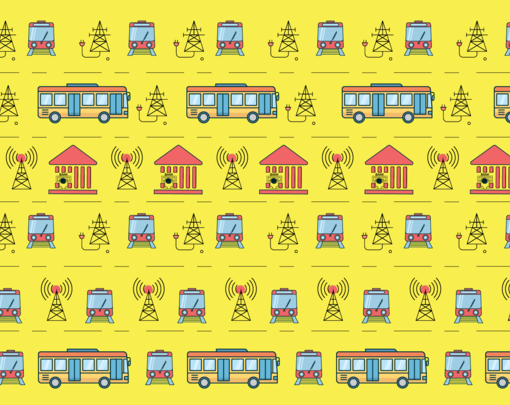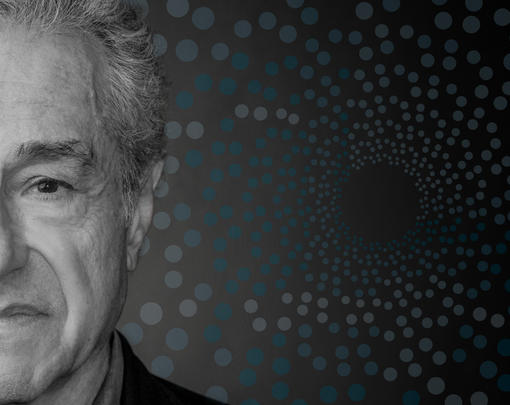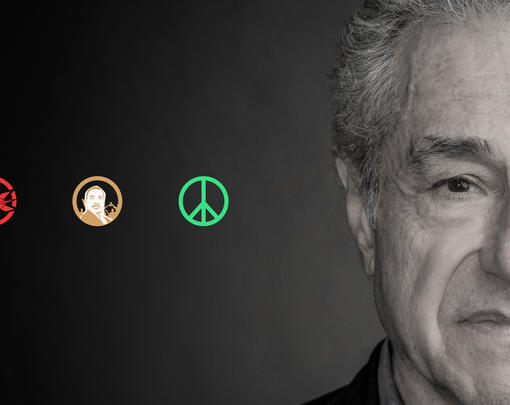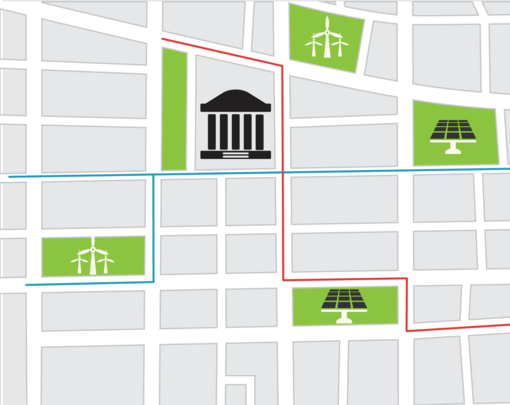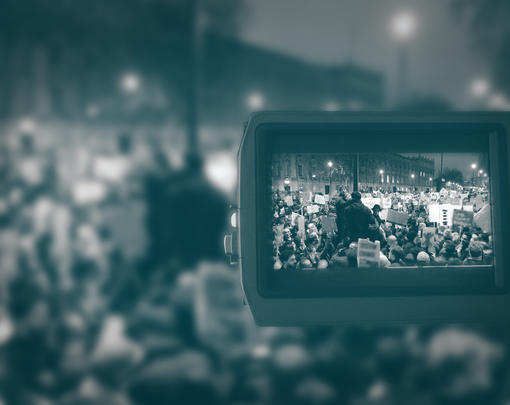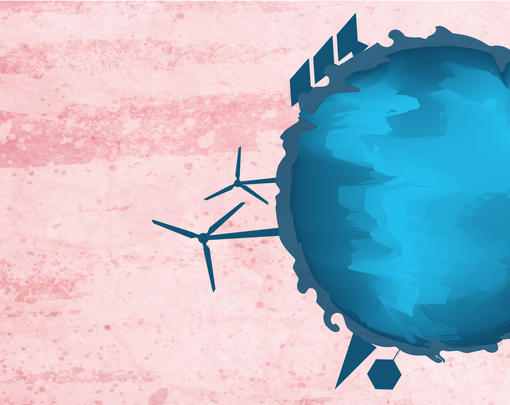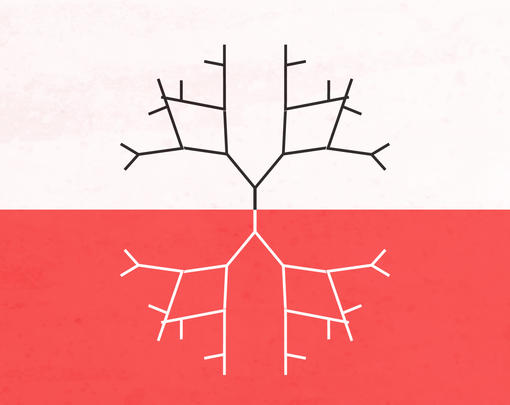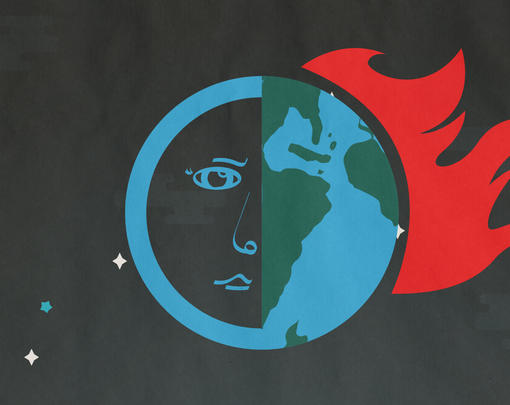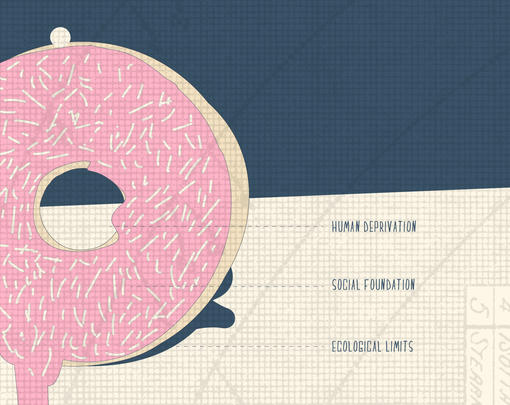Adam Simpson and Carla Santos-Skandier sat down with Jeremiah Lowery and Camila Thorndike, the Climate Justice Organizer and Carbon Pricing Coordinator, respectively, of the Chesapeake Climate Action Network (CCAN) to discuss the group’s campaign for a carbon fee and rebate program for the District of Columbia. The “Put A Price On It DC” proposal, resembling an early stage of a universal basic income, could have large implications for combatting both economic inequality and climate change.
The Next System Podcast is available on iTunes, Soundcloud, Google Play, and Stitcher Radio. You can also subscribe independently to our RSS feed here or download this individual episode by clicking this link.
Adam Simpson: Welcome to the Next System Podcast. I’m Adam Simpson. My co-host today is Ms. Carla Santos-Skandier, a colleague of mine at the next system project and one of the 2017 Oil Lab fellows for the Climate Strategies Accelerator. Carla, thank you for joining me today.
Carla Santos-Skandier: Hi, Adam. looking forward to this conversation. Thanks for having me.
Adam Simpson: Absolutely. And today we’ll be talking about “Put A Price On It DC,” an initiative that’s advocating for a carbon fee and rebate program for the District of Columbia. We’re joined today by two of the architects of the initiative. Ms. Camilla Thorndike and Mr. Jeremiah Lowery the carbon pricing coordinator and climate justice organizer respectively of the Chesapeake Climate Action Network. Camilla and Jeremiah, welcome to the program.
Camila Thorndike: Thanks so much. Great to be here.
Adam Simpson: So, before we dive into our questions, I wanted to give you both the opportunity to tell us a little bit more about your organization the Chesapeake Climate Action Network and the kind of work that the organization does.
Camila Thorndike: Great! So, the Chesapeake Climate Action Network, or CCAN for short, has been advocating for climate and clean energy policies in the DMV region for the last 14-15 years. We work in Maryland, D.C., and Virginia. And we run campaigns. That’s what makes us a little different from a lot of environmental groups. We’re really organizing people on the ground aiming very high in our legislative victory goals and then trying to check all the boxes as we transition to a clean energy economy.
Carla Santos-Skandier: So now we are looking to put a price on D.C. campaign. You guys are working on. So in your own words can you explain what these initiatives mean to you.
Camila Thorndike: So what we’re trying to do here in the District is pass the number one climate policy, which is putting a price on carbon, and we’re doing it in a really inclusive progressive way both in the process and the policy. There are 31 organizations in our coalition and we hope to soon pass this progressively rising price on carbon with a carbon fee on as much of the fossil fuels used in the District as possible, rebate them to drive the revenue back to D.C. residents as a quarterly check or electronic bank transfer, and then have some revenue set aside as well for green investments and small business tax credits.
Carla Santos-Skandier: Great. I do have a follow-up question if Adam doesn’t mind. So why decide to dedicate a vast majority of the tax revenue to the progress of rebates because I know there are other tax initiatives that actually focus more on green energy projects so I was just curious to understand the decision behind the rebate.
Camila Thorndike: That’s a fair question there’s a lot of different ways you can use the money. We’ve chosen to go with the most progressive revenue allocation possible. So if we consider what a current fee does it’s really increasing the dirty energy prices for every consumer. And you absolutely need to return some revenue back to consumers in order for it not to be a regressive tax meaning that the lowest income people in our community would be hardest hit and we’d be basically trying to solve the climate crisis on the backs of the poor and that’s just not a value that’s supported in our community and our coalition. So we wanted to flip that on its head and see if we could actually tackle economic injustice and this huge income gap in DC with this policy and actually make lower middle-income households better off than they were before. There is also revenue set aside for those clean energy and energy efficiency projects but not as much as might be the case elsewhere. The second part of the answer there is that we believe the price signal itself is actually what’s going to drive the majority of those innovations and investments. It’s the lack of private capital moving into these spaces more than what public revenue raise from a carbon fee can achieve.
Jeremiah Lowery: There was a recent report that showed that increasing inequality actually leads to more devastation and climate change, you know. And so, one of the reasons why we need to invest more in people is because addressing inequality actually addresses climate change at the same time. Cause people have more money in their pockets to able to buy local energy they’re able to invest more energy efficiency measures for individual selves and they generally like more healthy people who are more healthy or more likely to see their eyes rolling over on them in a better way. You know so investing more people are actually not actually addressing quality. So, it addresses climate change too.
Carla Santos-Skandier: I know that there are several carbon price initiatives in the United States right now. Do you have other initiatives that you follow very closely or that you’re particularly interested, or are similar to your own program? Additionally, what do you think makes the initiative for the district distinct from other carbon tax issues.
Camila Thorndike: Yes, a great question. I think many people are aware of how much activity is going on in the country on carbon pricing. Obviously, we need a federal policy but in the absence of that possibility, we have campaigns going from Washington, Oregon… And California is in the middle of quite the fight around renewing cap and trade. And then Massachusetts got a really robust campaign that’s been going for a number of years and they have a third of a legislature now formally co-sponsoring one of two current bills. Vermont is also very active and has been for a couple of years. New York has a large coalition growing and there are bills being introduced in Rhode Island and Connecticut. There’s even talk of maybe Maryland, Arkansas, and Utah trying to get things going. So here’s the question: You know which ones are we tracking most closely. I think that the proposals in Massachusetts really track pretty similar to the DC. There’s one in the Senate and one in the House. They’re the one that’s a dividend proposal and another one which has already gone back to people. It’s also more along the lines of a crowd talking about and the advocates they are supporting both. And I think that’s been the approach that we have here is really important is pricing carbon. Let’s come to a place of consensus and push for what’s politically reasonable.
Adam Simpson: So, I guess the next question will be how do you think that a carbon price would actually affect businesses and consumers in the district. And part of this question: specifically, who is paying this fee. You know I normally think of this as tax and dividend. I think the terminology you’re using with this is a “fee and rebate,” so who is paying the fee. Is it local businesses? Is it a fuel tax? Is it at the point of sale? So, I think that might be a critical thing I need to clear up initially.
Jeremiah Lowery: So, I guess the question is: How will this affect businesses?
Adam Simpson: Yes, and as I was speaking it popped into my head that I should probably clarify. How is the fee being paid?
Jeremiah Lowery: Well one it actually will help businesses, kind of like a minimum wage raising the minimum wage, more people have more money in their pockets, right? So, people are going to get checks. Especially working-class people are going to go out there and they’re going to spend money and so this will support a lot of businesses in Washington DC. It will actually probably lead to growth for a lot of restaurants, right, because people are always going to restaurants as well as more money spender just in general. In general, we’ve conducted a study that showed that I have almost no harmful effect on our businesses in Washington, DC.
Camila Thorndike: Yes really important point that we’re hoping to hammer home at an event on July, 27 with the economic modelers, Remy and the Center for Climate Strategies. The mechanics of the policy itself work by levying a fee at the first point of sale for fossil fuels in the district. The ideal again with a national policy is that it’s at the point of extraction of fossil fuels. So the fracking site the well head, the coal mine. But the district we don’t extract fossil fuels here, so that’s actually what makes it such a great place to process policy because every time we fill up a tank of gas or switch on the lights and half of it is coal powered, we’re bleeding money out of our community. And so by putting a fee on carbon in the form of electricity, mainly, as it comes into Pepco Exelon that that first point of sale from PJM into our utilities that’s where it would be levied. Same with natural gas—Washington Gas would be charged. And then transportation is a little trickier. Transportation emissions in the district account for only a quarter of our overall emissions profile. And that’s because we’re so dense and urban as opposed to maybe a greater state where you have more suburbs. And we have Metro and biking and a lot of walkable communities. But of the 25 percent, there are still emissions coming from gasoline. However, and we might talk about this later, the problem of leakage, and so we may not be able to put a fee on gasoline per se but try to capture those emissions in another way, directing DDOT and DOEE, the agencies overseeing transportation and energy and environment respectively to come up with a plan for using vehicle miles traveled or vehicle registration or parking or some other kind of touristic to make it work.
Carla Santos-Skandier: Yeah, you’re at actually my next question which was the leakage problem. And I think what Adam was trying to ask is where exactly is the point of regulation. With electricity, I don’t see much of the leakage problem going to other states right now.
So just to clarify would the gas station will be taxed in your proposal? You are just looking to other ways that you could address this leakage problem on the fact that part of the emissions right now in DC are from transportation. So, they’re not being taxed at this point. The proposal does not focus on the gas stations at this point?
Camila Thorndike: Right. Gas stations are exempt right now. We’re trying to account for vehicle cost pollution and other ways. As I mentioned, I wish that it were differently but maybe actually as the bill stipulates right now if Virginia and Maryland passed a carbon tax then the DC will be able to raise as well.
Adam Simpson: It would be better for businesses because we would have more money in their pocket and they’d probably spend it especially if working class people got that money. But do you expect businesses would inevitably pass this on to consumers and would that kind of temper any additional spending power? Or is that not something we’re worried about? Is the point that kind of the fee aspect of this works as kind of a disincentive toward more projects and goods and services that are producing more carbon emissions.
Camila Thorndike: So, this is such a resident friendly policy design that consumers on average the average family or household in DC is getting $2 back for every $1 that they would see and a passed down fee at 100 per cent passed out which is in the worst-case scenario, let’s say, which is not guaranteed by any means. The lowest income individuals in the district are going to get an even greater share of the revenue than everyone else just to make sure that they’re made whole. So, they’re going to be getting $4 for one. So that means that you know there’s really no scenario where this doesn’t end up being really a money maker or the beginnings of a universal basic income. That’s actually is part of the vision of this campaign for residents in DC. Now the impact on the economy at large which is going to be the kind of pictures being released on July 27 with this report but we’ve already seen the data and it shows that the economy stays intact like we have actually a slight uptick in jobs in GDP and that’s going back to Jeremiah’s point where it’s stimulative.
You know there’s a lot more money flowing through the economy because you don’t get your rebate check at the same time that your bill goes up. And so, they’re kind of disassociated in the consumer’s mind over time because they know there’s this carbon fee and they know that it’s going up. That’s where consumer spending choices change and people start to maybe save and look ahead and say well this time I’m really going to put that insulation in the attic or maybe I should buy that LED light bulb or maybe I can just ride my bike today instead of getting the car, right? And then they can save even more money.
Adam Simpson: And they’ll have the purchasing power to make those decisions.
Camila Thorndike: Exactly.
Jeremiah Lowery: Absolutely, you know, money flowing in the economy and people spending more, businesses are increasing their profits. The reasons are really to drastically change their business model based on this policy. They’re not going to be losing a ton of money because you’re going to have a ton of money coming in, especially with a lot of spending.
Camila Thorndike: Yeah, the hope is that… [Businesses are] so much better equipped than the average home, to make big investments in energy efficiency and buying renewable energy credits or entering into long term power purchase agreements for renewable energy. There’s already a number of programs in that district which businesses are taking full advantage of right now because for renewable energy because there’s not this push yet. There’s not a reason for them to sign up. And you know really really jump into the policies the district already has in place. We should be transparent though that it will you know it will mean a greater cost for some businesses depending on how energy intensive they are. And that’s really the point and I think the fundamental truth that we have to accept as a society to deal with climate change is that right now there’s a lot of false profit. There’s a lot of robbing from the future. And so the money that we’re making now for the kind of lifestyles and products and energy consumptive ways that we’ve gotten used to. Like why would we hold onto that and kick and scream about that more than just like actually having a livable planet tomorrow?
Adam Simpson: Business as usual isn’t going to work much longer.
Camila Thorndike: Exactly. It is going to impact some businesses. There’s going to be choices that need to be made.
Jeremiah Lowery: You know this is a separate issue, but as we address climate change in DC, as we move towards a cleaner economy the District really has to play its part to ensure that these programs are known to businesses in DC. As Camilla mentioned there are a lot of programs available to businesses, but a lot of businesses don’t know about it. So as we pass these policies it’s definitely on the DC government to do the outreach necessary to inform businesses of these programs. That’s a separate issue, but it’s definitely an important issue that hopefully the DC government will push down the road.
Carla Santos-Skandier: There’s one thing that intrigues me in this campaign. A lot of time when we talk about carbon price people refer to a carbon tax and dividend program. In this case, you guys are mentioning over and over again a carbon fee and rebate. So I was wondering if there’s any strategy or distinction on why you’re using a different terminology for your campaign.
Camila Thorndike: Yeah absolutely. It really comes down to a technical definition that we want to be clear about. A tax is levied by the government to raise revenue for the government. That’s not the point of this policy. We are putting a fee much like you would use a speeding ticket to disincentivize dangerous driving that could kill people. We need a fee on the fossil fuel industry that’s burning too much and killing people. So, it’s really just to adjust this massive market failure which you really can only do where so much is being externalized, right? And we need to internalize the cost of the fossil fuel economy into the price of fossil fuels in order to see the kind of change we need. Some folks could say, “All right, if you’re if you are using the revenue to say fund our schools that is a tax.” That’s a carbon tax. And that’s the correct way to use that term. I think for us because number one majority of revenues going back to people and that component is revenue neutral. There’s really only a small percentage of the revenue that’s being used for clean energy and energy efficiency projects. It really leans on the side of being a fee and it’s not to fund unrelated priorities. And as our conservative friends like to complain about, you know, “grow the size of government.” That is not the point of this policy.
Adam Simpson: God forbid!
Carla Santos-Skandier: Adam was mentioning before and both of you also addressing the economic benefits of this proposal and the economic justice behind the rebate but are there any other knock-on effects of your program that you can foresee?
Jeremiah Lowery: Absolutely. You know this policy is one it’s going to really push the economy to a clean energy economy where people are relying on solar power, wind power. People are biking more. Hopefully taking public transportation more. You know it’s cleaner air itself, it’s less smog in the air. So especially for some areas of D.C. like Georgia Ave and Rhode Island Ave a few years ago had one of the worst air quality in the nation. I believe this policy would do a lot toward actually addressing that as well as just in general addressing climate change. Climate change is going to affect communities east of the [Anacostia River], more so than other parts of the community here in Washington D.C. Their health facilities, their recreation centers are going to be flooded and destroyed when climate change really has a devastating impact on communities east of the river. So, this policy really hopefully puts a stop to that. It goes a long way. You can see the short-term benefits, but the long-term benefits are pretty magnificent.
Adam Simpson: It leads directly to our next question, actually. In some of the literature I read about this initiative it mentioned that this program would empower all to participate in the green economy and further suggested that the connection that you talked about before between economic inequality and climate justice… I was hoping you might elaborate a little bit more on your own understanding of how economic inequality is related to kind of meeting the challenge of climate change and what a carbon fee and rebate program would do in that intersection.
Jeremiah Lowery: Absolutely. This is one of the areas that I think advocates are really just trying to address. Environmentalists haven’t really brought the conversation around inequality into the environmental movement. So, this policy is one of those unique opportunities and real world applications. You’re actually really addressing inequality the same time as climate change. Hopefully, as we do to outreach to communities East of the Anacostia River, low-income communities, getting people on board knowing they’re going to get more money in their pockets. We can also engage folks to fight climate change and how this is connected. You’re not just getting a check but there’s a reason you’re getting this check. Because we’re holding big polluters economy. That’s part of the outreach and engagement we’re doing right now as we build up our movement and hopefully the folks that we engage in the movement we build with this policy we keep folks at the table. We keep folks at the table for the next fight especially people who normally weren’t involved in the movement to fight climate change are now involved because of policy. This movement is going to be inclusive to everyone and is actually going to be one of those situations where you have all these diverse people that aren’t normally involved in this fight for climate change at the table and hopefully will continue to be at the table as we push forward and make DC one of the most progressive cities in the world.
Camila Thorndike: I think we see across the world that when people lack self-sufficiency with either money in their pockets or plentiful, renewable, natural resources around, even thinking of firewood for instance, like if communities and families are stretched then they’ll use all of the available resources without a thought to “will they be there tomorrow?” That your runway for the future shortens to just this immediate moment and that generally leads to unsustainable consumption. Right? Because you just don’t have the time or space to think about how you going to plan. And that’s where we see a really vicious cycle because if people are stretched by weather disasters, by crop failures, by their livelihoods being destroyed, then there is no saving. There’s no planning. There is no long-term “What about not only tomorrow, but seven generations in the future?” And so that gets perpetuated. By the same token if you have a system where the one percent control the entire wealth of the world. That’s incredibly destructive. NASA has also even studied this, about six or so years ago drawing a direct link between income inequality and climate change. You have this pattern of civilizational collapse over millennia where if there’s an elite that controls these resources and the responsibility and care for them is not distributed throughout the population then things get out of balance really fast. And I think that’s what we’re seeing now is ‘spend like there’s no tomorrow because you have the money’ or ‘there literally is no tomorrow because you have nothing.’ We need the middle ground. We need to be everyone in our country empowered to do the right thing and empowered to live their lives. And that’s really what the fee and rebate program is all about.
Adam Simpson: This feels almost like a silly question but it seems on one level, is there kind of almost a perverse incentive here? If there’s a carbon fee on use and it benefits people when it gets in their pocket, would that lead some people to not be as interested in a kind of a draw of carbon emissions?
Camila Thorndike: That’s a very common question. The trick here is that you’re not just getting money. You’re seeing the prices of dirty, energy dependent products that you might buy go up and you’re your repelled, right? So at the same time that you’re like, “Hey actually I I don’t want to buy that Humvee because I know that gas is going to go up a couple bucks in the coming years. I can’t afford that.” You’re also getting the money in your pocket to then go get the hybrid, let’s say. Because money is fungible and you’re not making the same decisions the same economic decisions all the time, you’re going to consider… you know “OK here’s a here’s an expensive car here’s a cheaper cleaner energy option.” And then you get the money before to actually pay for that better decision.
The trick is that the fee has to keep increasing over time. And that’s what we’ve seen in British Columbia that’s had a carbon tax in place for many years. There’s was kept the increase was capped. And so as soon as the tax stopped rising, pollution went up again. And so that’s why our proposal you know starting at $20 going up $10 every year. That’s really where you start to see the kind of technological innovation and the long term investing and consumer decisions start to change.
Jeremiah Lowery: In the long run, it’s not going to make much business sense for companies to not be investing in electric vehicles. People are going to have more money in their pockets to actually buy electric vehicles once the other products are off the market. Simple as that. It’s kind of like a market approach. It’s economics 101.
Adam Simpson: And I’m only just seeing that I actually forgot about my Universal Basic Income question which I feel like I’ve sprung on everyone I’ve interviewed, but it makes sense to ask it here. So the revenue growth is different from what people would normally think of as a universal basic income. Everybody gets X amount of money per month, et cetera. How does, in your mind, this rebate differ from what you know was being proposed by Andy Stern or various Silicon Valley folks or whatever in these basic income programs? How is the carbon fee and rebate approach different from these approaches and maybe what’s better about it?
Jeremiah Lowery: One, what’s better about it is, a lot of other approaches get like Silicon Valley folks you get tech folks at the table—and that’s great. They’re coming up with the policy. I think this is unique in the sense that we have advocates who care about residents who are homeless, we have labor unions, environmentalists, we have just general activist and community folks at the table who are really pushing this policy forward in DC. In a sense, they may not actually know it’s a basic income, but once those checks start to flow we can actually see that universal basic income makes sense in DC, because we proved it. Because, one, this policy is working. But also, people are getting checks and inequality is actually decreasing. So hopefully down the road, people could think more deeply and also take basic income more seriously as a policy decision. And hopefully those groups who were at the table to pass this policy in DC this year can still be at the table and say “This policy made sense, those checks are working. Let’s possibly look at actually passing a universal basic income with an actual diverse coalition of folks.
Camila Thorndike: Also, I think a lot of the basic income ideas floating out there are really a basic income. They’re $50,000 or whatever it might be. That would be amazing. Ours is a starter, it’s to change the way we think about this. It’s not welfare it’s not something that you had to do something to deserve. This is just your right as a human being, as a citizen, as a resident, that you deserve basic economic security. And the way we’re going to fund it is also different. There’s a lot of great basic income ideas out there. There are fewer ideas of where to get the revenue and taxing use of the commons, as Peter Barnes has written about, is what this policy is based on. We all equally share the world and the atmosphere which private industry is dumping into for free and when they dump their waste, those greenhouse gases, it wrecks everything that we love in this world, right? And so why, if we have to pay to take our trash to the curb, should the wealthiest industry that ever existed on the planet not only pay nothing to dump their trash into our world but actually be subsidized. We need to turn that around. We need there to be a fee on that bad behavior and the revenue generated from that fee is owed to all of us because we are all sharing the planet and we’re all being impacted by climate change.
Carla Santos-Skandier: I do have a follow up before we jump into the next question because Camilla was mentioning the starting price of the proposal is that $20 per ton of CO2. And I’ve been somewhat familiar, and right now it seems to be pretty standard that everyone—even the most conservative studies—are looking to a minimum of $30 for a ton of CO2. And as you mentioned it is a progressive tax. So, it’s going to increase over time and maybe it’s going to balance out. I’m curious why you decided to start at $20 and not $30 or what. Is there any rationale besides behind that decision?
Camila Thorndike: Yeah there is. When we started a couple of years ago forming this coalition and researching policy and design options we looked around at where other states were doing and we’re actually on the higher end of what many states including Vermont and Massachusetts Oregon and Washington are considering cap and trade program. That’s all different. But basically, most of them hover around $10 or $15—$20 is a little bit more and we actually wanted to aim higher and were guessing that other forces were going to try to negotiate down. And because we’re adding $10 every year it’s climbing higher than some proposals which are only climbed by 5% or the rate of inflation. It’s really trying to present a proposal which seems you know automatically rational from the perspective of what our peer states are doing. Considering, Carla, that you’re right, the actual price per ton should be much more actually than $30. If you account for ocean acidification, there are some studies that show it should be over to $200 and to really get are to meet our climate goals over time by the end of the century it should be over $800. It’s steep because we’ve waited so long to do anything about this problem. But if we start low and we gradually increase over time everybody can plan.
Carla Santos-Skandier: That makes sense. Also, you probably heard the news in the last week or two weeks there is a national carbon proposal that grabbed a lot of attention in the news. So, for those who don’t know all there is a group of organizations including environmental organizations that do the Nature Conservancy and for the first time Big Oil, including Exxon and Shell stood out in support of these national carbon tax and dividend proposals. So, I’m just curious to know if you have any initial reactions to this proposal? Do you see it as a good proposal especially considering that it’s at the national level or if somehow relates to the “Put a Price On It DC” initiative that you guys are trying to move forward?
Camila Thorndike: Yeah definitely it was exciting to see that. It’s a different package in that ours is this one policy. Ours is only a carbon fee. There’s is combining our regulatory swamp and limitation of tort liability along with the carbon tax that they’re proposing. So, you know I think there is some genius in that plan to get the conversation started. And if Big Oil is recognizing that they’re on a dying path, then this is the beginning of a conversation for how they can actually retire sort of gracefully. However, the devil will be in the details. Is that carbon tax going to be high enough that the regulations that it would replace would actually be made redundant? Are those regulations just to do with climate? I mean it wouldn’t make sense to just repeal the Endangered Species Act like that’s a different issue, right?
Carla Santos-Skandier: Or even the Methane Rule.
Camila Thorndike: And the methane rule, right. So, I think there’s a lot of thoughtful people at our table. And the truth is that there’s no substantive legislative package or opportunity in this very moment but I’m really grateful that they are starting to lay the groundwork so that if that window opens down the line at least people know what the options are on the table and how we’re going to make those decisions. There’s going to have to be a compromise. Are we ready to do that?
Adam Simpson: The DC carbon price would achieve 20 percent reduction in greenhouse gas emissions by 2032. And that’s a huge step, but would more need to be done to reach carbon neutrality by 2050. Are there other policies that you think you would recommend to listeners to also be aware of and keep in mind as we can to you for them in the fight against climate change.
Camila Thorndike: Yeah. So, there’s the clean energy plan which the District Office of Energy and the Environment has been rolling out and it lists dozens upon dozens of policies and changes to the big building and energy codes and increases and you know electric vehicle utilization and infrastructure that would be needed to be in place for that. So, the short answer is yes. There’s a lot of other policies that need to be put in place. And without a strong price signal without a carbon fee and rebate program that increases over time, the truth is there’s not going to be enough demand for those policies. There’s not going to be enough demand for the infrastructure, for the building code changes, for the increase and you know noble perforce and all the other complimentary yours are kind of unrelated policies that will actually create a city that can function without fossil fuels. We have to stop waiting for that moment. That’s going to be somehow perfect to actually pass a price on carbon and commit to it now knowing that the whole landscape for those other policies will become much friendlier once we have it in place.
Adam Simpson: I think we’re about to move to kind of our final closing question. Is there anything further you’d like for us to add in about this carbon free rebate program that maybe we didn’t touch on so far.
Camila Thorndike: I’d say that it’s really exciting to push for this policy in DC because we have such a relatively friendly, let’s just say legislature the city council (but we should be a state!). So that’s unlike a lot of places in our country where there are passionate advocates who love for the opportunity to make this real.
And I really hope that any listeners in DC or the DMV [District of Columbia, Maryland, and Virginia area] will jump in because now’s the time when we really can’t wait. And we’ve done so much great work with the 30 organizations in this coalition and dozens and dozens of volunteers that have come in you know nights and weekends for a couple of years now to make sure that every council member is aware of this to make sure that they know it’s our number one priority. We have to keep our eyes on the ball because this is a difficult policy to pass. It makes all the sense in the world. And because we’re trying to change the whole system, it’s going to take all of us as Naomi Klein likes to say.
Jereimah Lowery: I’m pretty sure a lot of listeners have been paying attention to national politics. So if you’re a resident in DC you can’t help but always hear about what’s going on nationally and how you know things need to change at a national level in Congress. But I think right here in our own neighborhoods, right in our own communities, we have a really amazing opportunity actually to make a difference. A lot of times our city council members who come to our own coffee shops and stuff like that, we’ve got to ensure that they’re on board. We’ve got to show that our ANC commissioners are on board with the policies that we’re passionate about. This policy right here is a revolutionary policy that’s really going to change DC, as Camilla said, change the system. And if people care and all you have to do is usually go right across the street and visit a council member and say “Hey, do you support these policies? It’s usually as simple as that. And we hear all the time council members, “I changed my position because my constituents came to my coffee shop hours and told me they were passionate about this issue. That’s the reason why I support it.” Sometimes as simple as it is to get amazing policy done on a local level. But you got to show up, got to be engaged, you got to make the phone calls. You’ve got to volunteer. So, I really encourage people to volunteer, get involved. Even if it’s just writing out the computer and hitting send. It all matters in the end.
Carla Santos-Skandier: What is the course that the Put a Price on it DC campaign is on and what are the next steps? How can people help you guys move this project forward?
Camila Thorndike: Our website is carbonpriceDC.org. You can send a letter to your council members through that site and you can sign the petition, you can find volunteer opportunities. We’re out there in the community canvassing talking to our neighbors every single week. There’s an event that you can sign up for and when the session begins again in September we really need for this power base to be strong enough to push our council members to actually introduce the bill, hold a hearing, and then race until we actually get it done.
Jeremiah Lowery: Absolutely, the doors of the movement open, just come on in! As I mentioned before, just get involved. You know we all know what is going on nationally, we know all the terrible things are on a national level, but this is an amazing opportunity to change our cities and change our communities and be an example for the rest of the world. We can mobilize and we can organize and we can address climate change you know. And so you know I encourage your listeners to get on the website and get involved. Now’s the time now.
Adam Simpson: Absolutely. Well, we had a great conversation today. Thank you very much, Camilla and Jeremiah. Once again, visit their website at www.carbonpriceDC.org and get involved. I’m Adam Simpson and thanks to my co-host Carla for joining me today. But we’ll see you next time on the Next System Podcast. Thanks again.
Camila Thorndike: Thank you.




